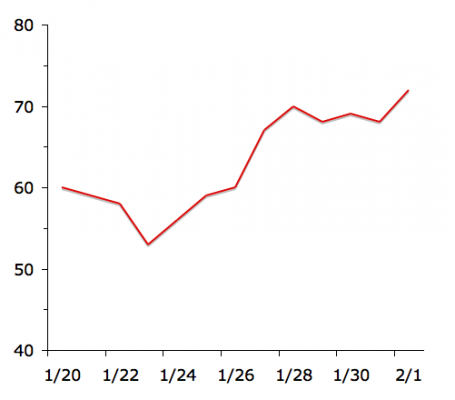Last week, Obama’s presidency, long noted for its dearth of major scandals compared to previous administrations, somehow pulled a hat trick. Benghazi, the IRS, and the Associated Press leak stories suddenly dominated all the available media coverage of the White House, and it was hard for anyone paying even modest attention to national politics to not get the impression that something bad was going on. And yet, at least up until now, these scandals do not seem to be hurting Obama’s approval ratings. Indeed, by some indicators, more Americans approve of his performance now than did so a week ago. How does this make any sense at all?
This is actually not the first time we’ve seen this sort of thing. The chart below shows President Clinton’s approval ratings in early 1998, when the public first learned about the Lewinsky scandal. As you probably recall, that was about the worst sort of coverage a president can get, plastered across every newspaper and broadcast on every news channel pretty much constantly for months. And yet, as you’ll note, his approval ratings jumped by roughly 10 points. Why?
Clinton Approval Rating in Jan.-Feb. 1998

There are a few theories that might explain it. One is that the public largely sympathized with Clinton. Not that they approved of his behavior—far from it—but that they felt that his affair did not warrant impeachment or the media firestorm that surrounded it, and they registered their dissent with the media and with overly enthusiastic congressional Republicans by supporting him.
Another theory, offered by John Zaller, my advisor when I was in graduate school, is that the public generally doesn’t factor scandals in when evaluating presidential performance. What they do care about are the same things they care about during elections: peace, prosperity, and moderation. The intense scandal coverage caused people to pay attention to politics in a non-election season. They evaluated Clinton’s performance and generally judged him to be running things well.
One or both of these mechanisms may be in play today. It may well be that the public is looking at the scandals and judging them to be not that bad for Obama. It’s really hard to figure out what nefarious thing he allegedly did with regards to Benghazi, and it’s easy to dismiss that “scandal” as the product of conflict-hungry media and the same sort of overzealous Republican leaders who think having a Marine hold an umbrella is an impeachable act. The IRS scandal, which may well be more serious, also apparently occurred far from the White House, and Obama’s reaction to it so far appears entirely appropriate. And the AP scandal basically pits reporters against national security interests, and the public (following leaders of both parties in recent years) have been inclined to lean toward the latter.
It also may be that Zaller’s theory is in play. People are evaluating Obama’s performance on the peace, prosperity, and moderation dimensions and finding him to be doing reasonably well. Recent economic indicators have been pretty solid, he’s been resisting urgings to commit armed forces to Syria, and he’s been pretty moderate in his public pronouncements of late. Now, this isn’t to say that scandals can’t hurt a presidency. Iran-Contra was very damaging to Reagan despite solid economic growth, and Watergate really did unravel Nixon’s presidency and cost Republicans dearly for several election cycles. But at least so far, despite pretty negative media coverage, we just haven’t seen scandals take much of a toll on the public’s support for Obama.





